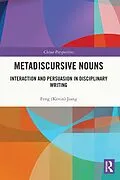Based on a 1.7-million-word corpus of 160 research articles from both soft and hard knowledge fields, this book sets out to explore how a particular type of noun - namely, the metadiscursive noun - is rhetorically used to mediate writer-reader interaction in disciplinary writing.
Analysts of academic discourse have come to regard hedges, reporting verbs, directives and so on as forming part of a wide repertoire of interactive features available to authors, suggesting a variety of terms, including evaluation, stance, appraisal, and metadiscourse. One aspect which has been less fully explored, however, is the rhetorical role nouns play in achieving writers' persuasive goals. This book fills the gap by proposing a particular type of nouns as metadiscursive nouns (as in "this supports our hypotheses that youth are more likely to co-offend when neighbourhoods are less disadvantaged"). The author aims to find out how writers employ metadiscursive nouns to engage and interact with readers in academic prose, raising theoretical and pedagogical implications and how they can be applied in the teaching of academic writing.
This book will be of particular interest to students and scholars working in the areas of English for academic purposes, corpus studies, academic writing, and linguistics in general.
Autorentext
Feng (Kevin) Jiang is Kuang Yaming Distinguished Professor in applied linguistics at Jilin University, China and has been researching and teaching in academic writing, corpus analysis and disciplinary discourse. His publications have appeared in most major applied linguistics journals.
Inhalt
Preface, 1 Introduction, 2 Review of Related Concepts, 3 Metadiscursive Nouns, 4 Methodology, 5 Overall results: frequency, distribution and wordlist, 6 Interactive function: anaphoric and cataphoric cohesion, 7 Interactional function: stance and engagement, 8 Conclusion
